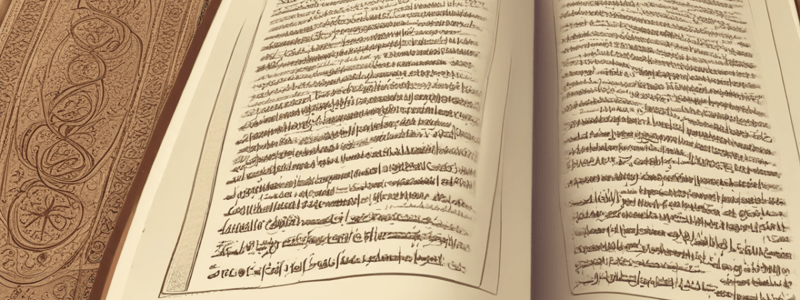Podcast
Questions and Answers
The methodology of the scholars of hadith strictly focuses on narrating and authenticating the verdicts of companions only.
The methodology of the scholars of hadith strictly focuses on narrating and authenticating the verdicts of companions only.
False (B)
A muhaddith is a scholar who devotes a part of their life to hadeeth study.
A muhaddith is a scholar who devotes a part of their life to hadeeth study.
False (B)
The term ustullah is related to the first 12 hadeeth discussed in this course.
The term ustullah is related to the first 12 hadeeth discussed in this course.
True (A)
The study of the methodology of scholars of hadith includes examining jurisprudential benefits without considering the authenticity of the hadeeth.
The study of the methodology of scholars of hadith includes examining jurisprudential benefits without considering the authenticity of the hadeeth.
What does the term muhaddith specifically refer to?
What does the term muhaddith specifically refer to?
Which of the following best describes the focus of the study of hadeeth methodology?
Which of the following best describes the focus of the study of hadeeth methodology?
Which of the following statements about the methodology of hadeeth is incorrect?
Which of the following statements about the methodology of hadeeth is incorrect?
What aspect of hadeeth is primarily focused on within the study methodology?
What aspect of hadeeth is primarily focused on within the study methodology?
What does authentication in hadeeth refer to?
What does authentication in hadeeth refer to?
The approaches taken by the scholars in narrating, authenticating, and compiling the ______.
The approaches taken by the scholars in narrating, authenticating, and compiling the ______.
A branch of knowledge dedicated to researching the approaches taken by scholars while authoring books of hadeeth is known as the study of ______.
A branch of knowledge dedicated to researching the approaches taken by scholars while authoring books of hadeeth is known as the study of ______.
A person who occupies themselves with hadeeth is called a ______.
A person who occupies themselves with hadeeth is called a ______.
The term used for the conditions adhered to by scholars for selecting specific hadeeth is known as ______.
The term used for the conditions adhered to by scholars for selecting specific hadeeth is known as ______.
The clear path to studying hadeeth is referred to as ______.
The clear path to studying hadeeth is referred to as ______.
Match the following terms with their definitions:
Match the following terms with their definitions:
Match the concepts related to hadeeth methodology:
Match the concepts related to hadeeth methodology:
Match the following elements with their implications in hadeeth study:
Match the following elements with their implications in hadeeth study:
Match the following terms with their roles in hadeeth scholarship:
Match the following terms with their roles in hadeeth scholarship:
Match the following scholars or texts with their contributions:
Match the following scholars or texts with their contributions:
Match each concept with its description in hadeeth studies:
Match each concept with its description in hadeeth studies:
Flashcards are hidden until you start studying
Study Notes
Definition of “The Methodology of the Scholars of Hadith”
- Refers to techniques used by scholars for narrating, authenticating, and compiling hadeeth.
- Represents an organized approach to the study of hadeeth, ensuring accuracy and reliability.
The Study of Methodology
- A distinct field of study focused on the practices of scholars when writing hadeeth books.
- Involves categorization, arrangement, and selective narration of specific ahaadith.
- Aims to uncover jurisprudential and related benefits provided through the mentioned ahaadith.
Key Terms Defined
- Muslim Ibn Ahmed: Noteworthy for compiling around 430,000 hadeeth.
- al-manhaj: Signifies a clear path or methodology in the context of hadeeth studies.
- Muhaddith: Designation for a person dedicated to the study and narration of hadeeth.
- Scholar of hadeeth: An individual who commits their life to the study of hadeeth.
Focus Areas in Hadith Methodology
- Narrations: Typically address new reports or accounts.
- Authentication: Involves verification of sources that are traced back to the Prophet Muhammad and his Companions.
- Compiling: Emphasizes the importance of systematically organizing hadeeth; foundational for proper study and reference.
- Ustullah: Refers to principles related to the methodology of hadeeth studies, particularly within the first twelve hadith.
Objectives of Scholars
- Strive for accurate representation and interpretation of hadeeth.
- Contribute to Islamic jurisprudence by contextualizing narrations in legal frameworks.
Definition of “The Methodology of the Scholars of Hadith”
- Refers to the systematic approaches employed by scholars in narrating, authenticating, and compiling hadeeth (Prophetic traditions).
Technical Definition
- Involves methods for evaluating and preserving the authenticity and integrity of hadeeth narratives.
Study of the Methodology
- Represents a distinct field of knowledge that examines scholars’ techniques in composing hadeeth literature.
- Focuses on categorization, organization, selection criteria for ahaadith, and deriving jurisprudential benefits from them.
Key Figures and Terminology
- Muslim Ibn Ahmed: Compiled approximately 430,000 hadeeth.
- Al-manhaj: Term used to describe a clear methodological path in hadeeth studies.
- Muhaddith: Individual who engages deeply with hadeeth narratives.
- Scholar of hadeeth: Someone completely devoted to the study and transmission of hadeeth.
Aspects of Hadeeth
- Narrations: Typically consist of newly transmitted accounts from the Prophet Muhammad.
- Authentication: Relies on references traced back to the Prophet and his companions.
- Compiling: Emphasis on systematic and organized collection of hadeeth materials, often formatted around specific schools of thought.
Importance of Hadeeth
- The methodology assists in ensuring the reliability of transmitted narratives and facilitates understanding of Islamic jurisprudence.
Definition of “The Methodology of the Scholars of Hadith”
- Refers to the systematic approaches employed by scholars in narrating, authenticating, and compiling hadeeth (Prophetic traditions).
Technical Definition
- Involves methods for evaluating and preserving the authenticity and integrity of hadeeth narratives.
Study of the Methodology
- Represents a distinct field of knowledge that examines scholars’ techniques in composing hadeeth literature.
- Focuses on categorization, organization, selection criteria for ahaadith, and deriving jurisprudential benefits from them.
Key Figures and Terminology
- Muslim Ibn Ahmed: Compiled approximately 430,000 hadeeth.
- Al-manhaj: Term used to describe a clear methodological path in hadeeth studies.
- Muhaddith: Individual who engages deeply with hadeeth narratives.
- Scholar of hadeeth: Someone completely devoted to the study and transmission of hadeeth.
Aspects of Hadeeth
- Narrations: Typically consist of newly transmitted accounts from the Prophet Muhammad.
- Authentication: Relies on references traced back to the Prophet and his companions.
- Compiling: Emphasis on systematic and organized collection of hadeeth materials, often formatted around specific schools of thought.
Importance of Hadeeth
- The methodology assists in ensuring the reliability of transmitted narratives and facilitates understanding of Islamic jurisprudence.
Definition of “The Methodology of the Scholars of Hadith”
- Refers to the systematic approaches employed by scholars in narrating, authenticating, and compiling hadeeth (Prophetic traditions).
Technical Definition
- Involves methods for evaluating and preserving the authenticity and integrity of hadeeth narratives.
Study of the Methodology
- Represents a distinct field of knowledge that examines scholars’ techniques in composing hadeeth literature.
- Focuses on categorization, organization, selection criteria for ahaadith, and deriving jurisprudential benefits from them.
Key Figures and Terminology
- Muslim Ibn Ahmed: Compiled approximately 430,000 hadeeth.
- Al-manhaj: Term used to describe a clear methodological path in hadeeth studies.
- Muhaddith: Individual who engages deeply with hadeeth narratives.
- Scholar of hadeeth: Someone completely devoted to the study and transmission of hadeeth.
Aspects of Hadeeth
- Narrations: Typically consist of newly transmitted accounts from the Prophet Muhammad.
- Authentication: Relies on references traced back to the Prophet and his companions.
- Compiling: Emphasis on systematic and organized collection of hadeeth materials, often formatted around specific schools of thought.
Importance of Hadeeth
- The methodology assists in ensuring the reliability of transmitted narratives and facilitates understanding of Islamic jurisprudence.
Studying That Suits You
Use AI to generate personalized quizzes and flashcards to suit your learning preferences.




